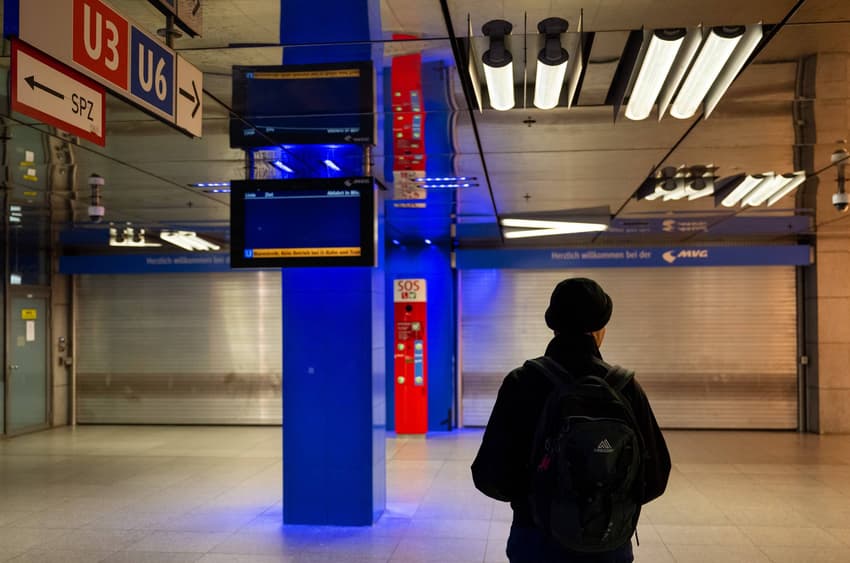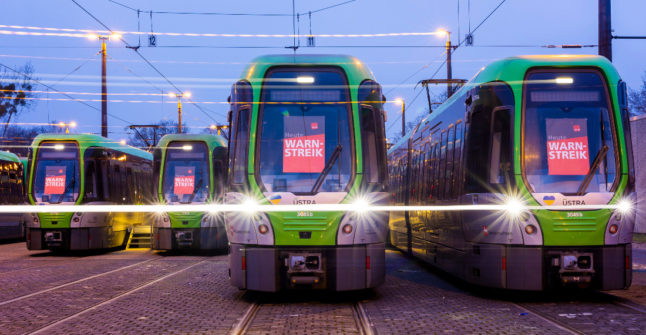Who is most affected by Friday's public transport strikes across Germany?

On Friday, public transport workers in six German states went on strike in a continued battle over wages. Here's who's the most affected - and if the strikes will stretch further into the spring.
Commuters and travelers around Germany must expect cancellations and delays of buses and trains on Friday due to strikes on local public transport (ÖPNV). The trade union Verdi shut down local public transport almost across the board in six German states starting at 3 am Friday.
The union wants to increase the pressure in collective bargaining for public sector workers.
READ ALSO: Public transport disruption on Friday as workers across Germany strike
When and where will the strike take place?
The states affected are Hesse, North Rhine-Westphalia, Baden-Württemberg, Saxony, Lower Saxony and Rhineland-Palatinate, although the main focus area is the Ruhr area and the Rhineland.
But individual cities are also affected. In Munich, a two-day warning strike already began on Thursday, shutting down the U-Bahn, trams and about 50 percent of buses.
On Friday, Verdi extended the strike to other regions and cities: Central Franconia, Augsburg, Regensburg, Ingolstadt, Bamberg, Landshut and Bayreuth. The strike started with the first early shift at around 3:00 am and is set to last for 24 hours.
What options do travelers have?
Deutsche Bahn and other private transport companies are not affected by the strikes. Therefore, travelers and commuters might have the option to switch to commuter trains, regional trains (RB) and regional express trains. Other alternatives include ride-sharing or carpooling, as well as bicycles or e-scooters.
Taxi costs are not usually reimbursed by public transport companies, except in exceptional cases such as unforeseeable events, for example technical defects or natural disasters.

Trams in Hanover warn riders early Friday morning about the strike. Photo: picture alliance/dpa | Moritz Frankenberg
What is the collective bargaining dispute about?
In the negotiations for the approximately 2.5 million state and federal public sector employees, Verdi and the civil servants' association dbb are demanding 10.5 percent more pay, or at least €500 more per month due to high inflation, the energy crisis and staff shortages.
The second round of negotiations last week did not result in an agreement, with the union rejecting the offer as insufficient. That offer included a total pay increase of five percent in two steps and a one-time payment totaling €2,500.
Is there a threat of a prolonged wave of strikes?
If there is no agreement in the third round of collective bargaining on March 27th, Verdi head Frank Werneke is planning to hold a ballot among the union’s members about extending the strike into the spring, Werneke told DPA.
Werneke rejected criticism that Verdi’s demands are too high. "If this is implemented, it will just about compensate for inflation. That is reasonable and that is also possible," he said.
Until the negotiation date, the union will "step it up a notch" with its actions, he announced. "We still have a lot of things planned."
The Bavarian Business Association (vbw) criticised the announced warning strikes.
"The strikes are formally directed against the collective bargaining partner and the public transport operators, but are in fact against the passengers," said vbw CEO Bertram Brossardt.
Why the joint protest with "Fridays for Future"?
The strikes are taking place in parallel with nationwide protest actions by the organization Fridays for Future.
The protest actions are about pointing out the need for a traffic turnaround and emphasizing the importance of environmentally friendly means of transport, including bicycles and e-scooters.
"A transport turnaround will not be possible without investing in employees as well," said Verdi deputy leader Christine Behle in a statement earlier this week.
"In Germany alone, we are taking to the streets for this in over 200 cities," announced "Fridays for Future" spokeswoman Lou Töllner.
The largest rallies are expected in Berlin, Hamburg and Cologne.
Is traffic chaos looming in Dortmund?
Football fans who want to attend the Bundesliga match between Borussia Dortmund and RB Leipzig will have to prepare for considerable difficulties getting to and from the game Friday. Dortmund's public transport company DSW21 announced that bus and light rail services will be completely shut down.
The sports club Borussia Dortmund (BVB) fears traffic chaos and recommends that fans get to the stadium early.
About 30,000 of the 81,365 spectators in the sold-out stadium usually come by public transport, explained a DSW21 spokesman. In addition, the local transport company normally also offers a shuttle service, but this was also cancelled. Fans arriving by car should be prepared for longer walks or to use other alternatives.
Comments (1)
See Also
Commuters and travelers around Germany must expect cancellations and delays of buses and trains on Friday due to strikes on local public transport (ÖPNV). The trade union Verdi shut down local public transport almost across the board in six German states starting at 3 am Friday.
The union wants to increase the pressure in collective bargaining for public sector workers.
READ ALSO: Public transport disruption on Friday as workers across Germany strike
When and where will the strike take place?
The states affected are Hesse, North Rhine-Westphalia, Baden-Württemberg, Saxony, Lower Saxony and Rhineland-Palatinate, although the main focus area is the Ruhr area and the Rhineland.
But individual cities are also affected. In Munich, a two-day warning strike already began on Thursday, shutting down the U-Bahn, trams and about 50 percent of buses.
On Friday, Verdi extended the strike to other regions and cities: Central Franconia, Augsburg, Regensburg, Ingolstadt, Bamberg, Landshut and Bayreuth. The strike started with the first early shift at around 3:00 am and is set to last for 24 hours.
What options do travelers have?
Deutsche Bahn and other private transport companies are not affected by the strikes. Therefore, travelers and commuters might have the option to switch to commuter trains, regional trains (RB) and regional express trains. Other alternatives include ride-sharing or carpooling, as well as bicycles or e-scooters.
Taxi costs are not usually reimbursed by public transport companies, except in exceptional cases such as unforeseeable events, for example technical defects or natural disasters.

What is the collective bargaining dispute about?
In the negotiations for the approximately 2.5 million state and federal public sector employees, Verdi and the civil servants' association dbb are demanding 10.5 percent more pay, or at least €500 more per month due to high inflation, the energy crisis and staff shortages.
The second round of negotiations last week did not result in an agreement, with the union rejecting the offer as insufficient. That offer included a total pay increase of five percent in two steps and a one-time payment totaling €2,500.
Is there a threat of a prolonged wave of strikes?
If there is no agreement in the third round of collective bargaining on March 27th, Verdi head Frank Werneke is planning to hold a ballot among the union’s members about extending the strike into the spring, Werneke told DPA.
Werneke rejected criticism that Verdi’s demands are too high. "If this is implemented, it will just about compensate for inflation. That is reasonable and that is also possible," he said.
Until the negotiation date, the union will "step it up a notch" with its actions, he announced. "We still have a lot of things planned."
The Bavarian Business Association (vbw) criticised the announced warning strikes.
"The strikes are formally directed against the collective bargaining partner and the public transport operators, but are in fact against the passengers," said vbw CEO Bertram Brossardt.
Why the joint protest with "Fridays for Future"?
The strikes are taking place in parallel with nationwide protest actions by the organization Fridays for Future.
The protest actions are about pointing out the need for a traffic turnaround and emphasizing the importance of environmentally friendly means of transport, including bicycles and e-scooters.
"A transport turnaround will not be possible without investing in employees as well," said Verdi deputy leader Christine Behle in a statement earlier this week.
"In Germany alone, we are taking to the streets for this in over 200 cities," announced "Fridays for Future" spokeswoman Lou Töllner.
The largest rallies are expected in Berlin, Hamburg and Cologne.
Is traffic chaos looming in Dortmund?
Football fans who want to attend the Bundesliga match between Borussia Dortmund and RB Leipzig will have to prepare for considerable difficulties getting to and from the game Friday. Dortmund's public transport company DSW21 announced that bus and light rail services will be completely shut down.
The sports club Borussia Dortmund (BVB) fears traffic chaos and recommends that fans get to the stadium early.
About 30,000 of the 81,365 spectators in the sold-out stadium usually come by public transport, explained a DSW21 spokesman. In addition, the local transport company normally also offers a shuttle service, but this was also cancelled. Fans arriving by car should be prepared for longer walks or to use other alternatives.
Join the conversation in our comments section below. Share your own views and experience and if you have a question or suggestion for our journalists then email us at [email protected].
Please keep comments civil, constructive and on topic – and make sure to read our terms of use before getting involved.
Please log in here to leave a comment.